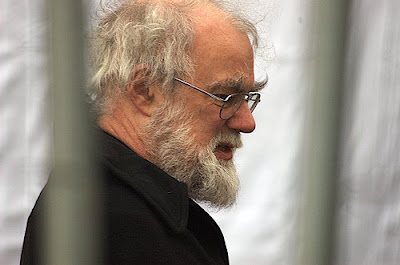 Rowan Williams likes to tell the story of Pope John XXIII, who woke up worrying about a problem.
Rowan Williams likes to tell the story of Pope John XXIII, who woke up worrying about a problem.He said to himself: “I'll consult the Pope about that.”
Then he thought: “Wait a minute, I am the Pope.”
The Archbishop may reflect in days to come, as he tries to avert schism in an unravelling Anglican Communion, on the vicissitudes of his job.
When he was marked out as a frontrunner for the role of leading the Anglican Church five years ago, Dr Williams said that he did not want the job.
Yet Dr Williams as reluctant appointee does not fit entirely with the image described by those who attended the 1998 Lambeth Conference.
As Bishop of Monmouth then, Dr Williams presented a key paper to the conference on making moral decisions. He also spent time with almost everyone there. It is said that the only other bishop who worked the circuit as effectively was another favourite for Canterbury, the Bishop of London, the Right Rev Richard Chartres.
A decade on, and there is a strong possibility that when the three-week Lambeth Conference at Kent University in Canterbury ends, the worldwide Anglican Communion and its 38 provinces will be farther apart than ever.
While some speculate on how the pressures must be taking their toll, inside the mind of the most complex and spiritual of archbishops a quite different process is taking place.
Dr Williams has said he feels “great grief” that more than 200 of 880 bishops invited are boycotting the event and described this as a “wound” to the meeting.
But his mood generally can only be described as buoyant.
Asked by The Times how things were going at the launch party for his wife Jane's book on being married to a bishop, Dr Williams said: “Don't ask.”
When congratulated on the first signs of peace among the bishops after just one day of prayer, Bible study and lectures at Canterbury Cathedral, he said: “It's nothing to do with me, it is all down to the cathedral.”
These were typical of his self-deprecating humour that is becoming blacker in sympathy with the day. The episcopal impression of an indecisive man wringing his hands in futile despair is not entirely false, just multilayered.
Dr Williams is cheerful, confident and thriving on the ultimate challenge that could be presented to any church leader. The Anglican Communion is a cross he has to bear, but in the Christian theology of the Cross, he carries that cross happily and with conviction.
And behind the scenes the Archbishop - who believes that God takes care of the results only if His people put in the footwork - is engineering a daring and complex plan.
Canon lawyers are working on a canon law “blueprint”, an Anglican version of the Roman Catholic code that would provide a basis for legislative unity.
It is likely to become a fifth “instrument of communion” to bind the Church, adding to the four that exist - the Archbishop of Canterbury, the Lambeth Conference, the Anglican Consultative Council and the primates.
Dr Williams writes in the foreword of The Principles of Canon Law, which sets out the basis of the blueprint handed to bishops at the conference, that it will not solve the communion's problems, but is a “unique resource for thinking more carefully about the sort of unity and coherence we should aspire to in our fellowship of churches”.
Moderate conservatives are also drawing up plans to allow overseas primates to function in the Episcopal Church of the USA as pastors for evangelical churches offended by the liberal direction. It is hoped that the presiding bishop of the Episcopal Church, Katharine Jefferts Schori, might agree to this to allow the communion to hold together. She is understood to be “aware” of the discussions.
This would leave the primates of Nigeria, Rwanda and Uganda, which have flouted the authority of Bishop Jefferts Schori by illicitly consecrating bishops to serve in the US, out in the cold but would permit moderate evangelical bishops and provinces, to stay in the communion with integrity.
Dr Williams's advisers are also working on ways of trying to persuade the US Church not to go any farther down the path of liberalisation and of taking action against provinces that have conducted illicit consecrations.
On the surface, it is all Jesus, God and Holy Spirit at Canterbury. The bishops are hugging and making up.
But behind the scenes it is murder in the cathedral as usual. And Dr Williams is loving every minute.
+++++++++++++++++++++++++++++++++++++++++++++++++++
No responsibility or liability shall attach itself to either myself or to the blogspot ‘Clerical Whispers’ for any or all of the articles placed here.
The placing of an article hereupon does not necessarily imply that I agree or accept the contents of the article as being necessarily factual in theology, dogma or otherwise.
Sotto Voce
